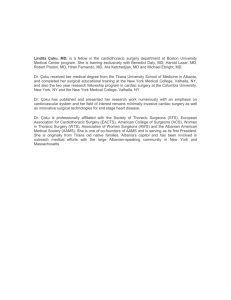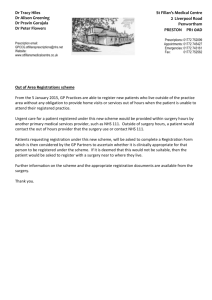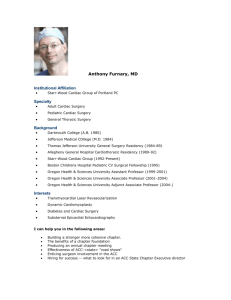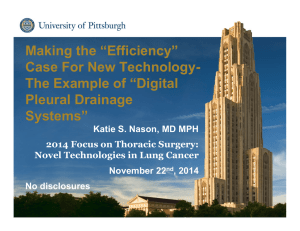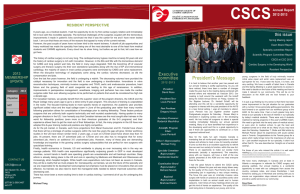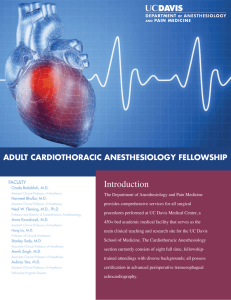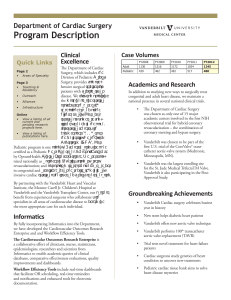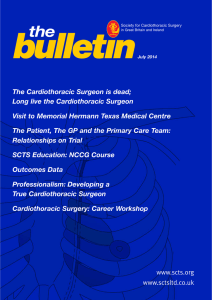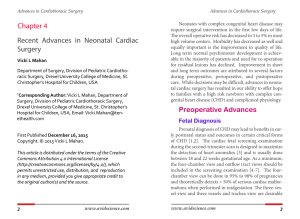R IMPROVING THE CREDIBILITY OF INFORMATION ON HEALTH CARE OUTCOMES
advertisement
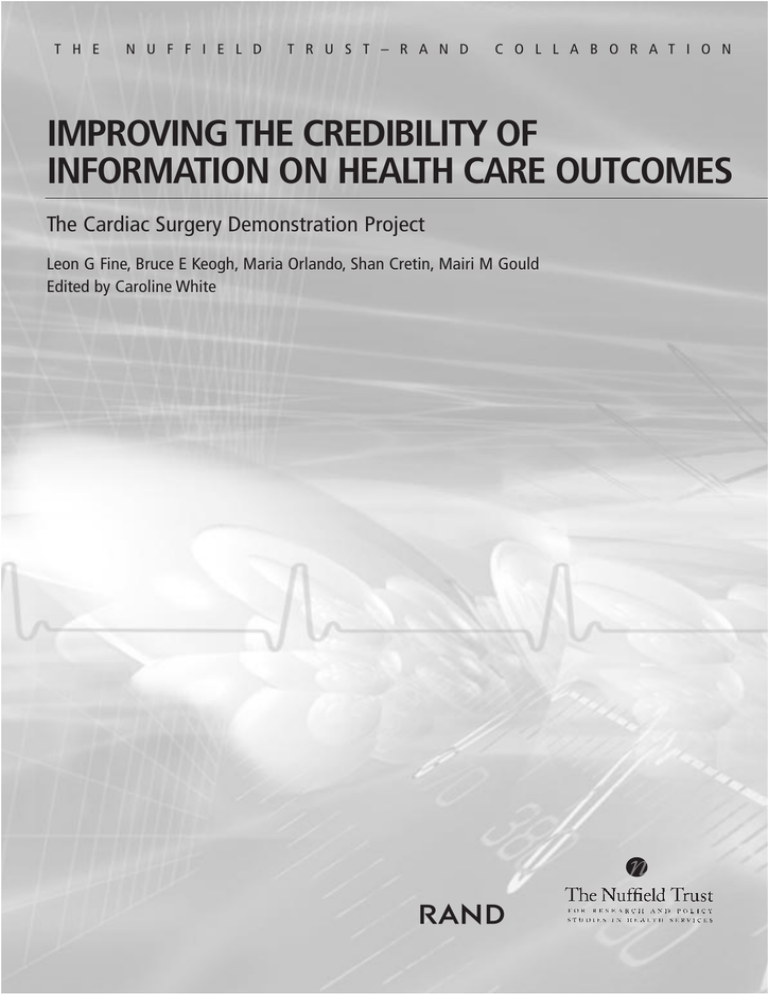
T H E N U F F I E L D T R U S T – R A N D C O L L A B O R A T I O N IMPROVING THE CREDIBILITY OF INFORMATION ON HEALTH CARE OUTCOMES The Cardiac Surgery Demonstration Project Leon G Fine, Bruce E Keogh, Maria Orlando, Shan Cretin, Mairi M Gould Edited by Caroline White R ISBN 1-902089-90-1 © The Nuffield Trust, 2003 Published by The Nuffield Trust 59 New Cavendish Street London WIG 7LP Telephone: 020 7631 8450 Facsimile: 020 7631 8451 E-mail: mail@nuffieldtrust.org.uk Website: www.nuffieldtrust.org.uk Charity Number: 209201 Designed by Nicholas Moll Design Telephone: 020 8879 4080 Printed by The Ludo Press Ltd Telephone: 020 8879 1881 E X E C U T I V E S U M M A RY The hearings for the Bristol Royal Infirmary Inquiry changed public and professional opinion about the need for much greater public accountability of NHS health care organisations and those working within them than was customary. One of the key recommendations of the Inquiry was that there should be systematic internal and external monitoring of the clinical performance of health care professionals and hospitals, with the aim of identifying and sharing examples of good practice and flagging up poor performance. The government responded, with a promise to publish high quality health information about the quality of care, relating to specific units and, in time, specific consultants. Research shows that quality of care is measurable but dependent on the physicians, health care team or setting in which the patient is being treated. Quality of information about health care is pivotal to assessing the extent to which quality initiatives actually improve quality of care. Cardiothoracic surgeons were the first specialist group to audit their own clinical results unit by unit and surgeon by surgeon, but the results had remained confidential. To prepare the results for public release, ensuring that the figures were fully adjusted to take account of disease severity, an assessment was made of the quality of data submitted to the National Adult Cardiac Surgery Database of the Society of Cardiothoracic Surgeons of Great Britain and Ireland. The assessment entailed checking the reliability and completeness of information on first time isolated coronary artery bypass surgery, submitted to the Database over two periods totalling 17 months. Deficiencies and inaccuracies were fed back to the 10 units taking part in the study, with the aim of improving the data content and enhancing the accuracy of risk adjusted mortality figures. The project revealed deficiencies in the completeness and reliability of the information supplied to the Database, with around 25% of essential information required for risk adjustment missing from the case records. Most of this was found in the case records after review, but had not been entered on to the Database. 9 I M P R O V I N G T H E C R E D I B I L I T Y O F I N F O R M AT I O N O N H E A LT H C A R E O U T C O M E S Five months of monitoring, validation and feedback improved the overall quality, and significantly increased the amount of initial data provided. But participating centres found risk adjustment difficult and they were let down by poor quality NHS information technology, including the absence of computerised mortuary records. But after risk adjustment had been recalculated, death rates across all the centres were very similar, providing public reassurance on the competence of NHS cardiothoracic units and emphasising the need to contextualise performance data in the light of case mix. The poor response to a further request for data from the units involved after the project had been completed highlights the difficulties of sustaining a credible database once external surveillance has been withdrawn. Without effective data capture, management and independent monitoring of data quality, it will be impossible to achieve the level of reliable information required for issue into the public domain, to improve clinical decision making and, ultimately, patient care. To address this on a national scale for heart surgery will require a relatively modest investment to put in place the infrastructure required to improve and maintain the quality of information at the highest level. Up to now, the process has relied entirely on the goodwill and voluntary endeavour of a few members of the Society of Cardiothoracic Surgeons of Great Britain and Ireland, and this cannot be allowed to continue. Recommendations: ● A comprehensive system-wide improvement in information technology networks for both administrative and clinical data is essential to provide reliable CABG data. ● A dedicated data manager should be employed in each heart surgery centre providing risk adjusted outcomes. ● A permanent cycle of independent external monitoring and evaluation of data quality should be established for a database providing information on cardiac surgery. ● The amount of data required must be manageable and appropriate to the available local resources, to prevent it from becoming an undue burden. ● A standardised system of risk adjustment/stratification for outcomes data on heart surgery should become part of clinical governance. ● Information on the performance of individual units and surgeons, intended for public release, should be validated by an independent source before issue. ● The potential problems relating to the long term use of confidential patient information, inherent in current legislation, must be addressed. ● The involvement of the speciality is essential to ensure high compliance with, and instil confidence in, public release of data used to judge performance, but to the extent that the public and the media will not lose faith in its independence. ● The inherent weaknesses of clinical outcome databases, as highlighted by the Cardiac Surgery Demonstration Project, must be fully recognised and communicated to the public in a comprehensible way, to avoid invidious and unhelpful comparisons between centres and individuals. 10
